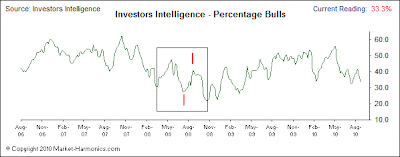Were only stocks in the midst of a new bull market! Then, this contrarian view believing stocks are a good buy here might hold water. However, in a bear market sentiment works differently. You might say a wider disbelief (i.e. less bullishness) removes the greater fool to whom shares might be sold, thus leaving stock prices with a less stable floor.
Need proof?

The above data is not from the American Association of Individual Investors. Rather, this is the consensus of more savvy investment newsletter writers surveyed weekly by Market Harmonics. Insight into how a low bullish sentiment can be misread still is much the same.
Set your sight on July 2008. Following a sell-off taking major stock indexes below lows set in March 2008 the percentage of bullish investment newsletter writers likewise fell below its March 2008 low, reaching about 27%. Surely, observers of this data who possessed a misplaced, bull market mindset thought this an opportunity to buy stocks (just as now). Subsequently, a relatively uneven market recovery resulted in the bullish percentage rising to 40%ish by late-August, 2008 — still relatively meager looking back over the stock market's more positive years prior to 2008, and so, no reason for those wrongly possessing a bull market mindset to think anything but positively toward stocks.
The stock market's September-October, 2008 bloodbath demonstrates how diminished bullishness might be rightly regarded during a bear market. Unlike the case in a bull market, where a diminished bullish consensus reveals a wealth of unbelievers yet to buy in, in a bear market this might be seen as circumstance weakening the floor supporting stocks. In a bull market detractors eventually are likely to chase prices higher, whereas in a bear market they simply will stay away, providing no bid at a time when the market most needs it.
No comments:
Post a Comment